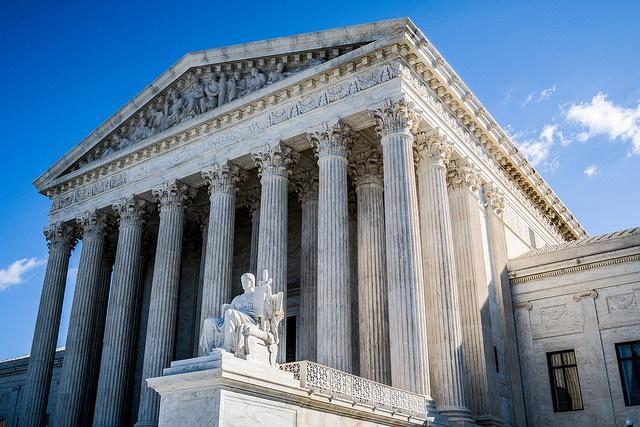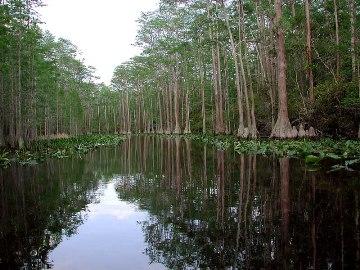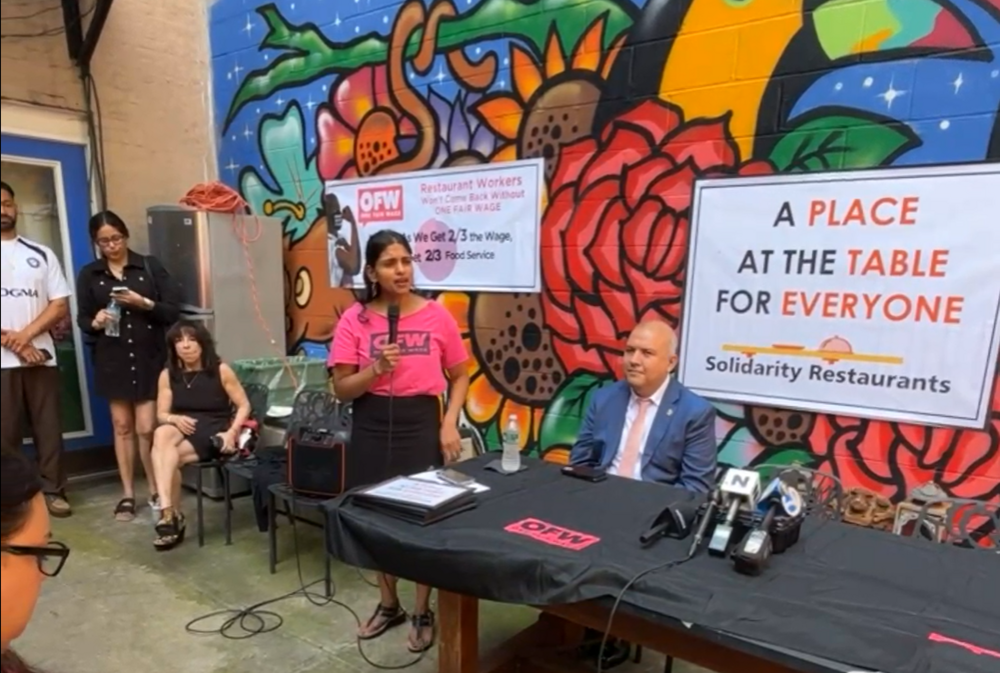
Section Branding
Header Content
Georgia Today: SCOTUS rules on power of lower courts; Okefenokee Wildlife Refuge land deal
Primary Content
On the Friday, June 27 edition of Georgia Today: The U.S. Supreme Court rules lower courts can no longer block executive orders on birthright citizenship; the deadline approaches for families to apply for Georgia's Promise Scholarship; and a look at how the land deal preserving the Okefenokee National Wildlife Refuge was made.

Orlando Montoya: Hello and welcome to the Georgia Today podcast. Here we bring you the latest reports from the GPB Newsroom. On today's episode, the U.S. Supreme Court rules lower courts no longer can block executive orders on birthright citizenship, the deadline approaches for families to apply for Georgia's Promise scholarship, and a look at how a titanium mine project near Georgia's Okefenokee National Wildlife Refuge was halted.
Stacy Funderburke: We have a long track record of being able to step into these situations, bring our capital, put it at risk, and get a conservation buyout done.
Orlando Montoya: Today is Friday, June 27. I'm Orlando Montoya, and this is Georgia Today.

Story 1:
Orlando Montoya: The U.S. Supreme Court has sided with the Trump administration in a ruling affecting the power of lower courts. GPB's Sarah Kallis reports the decision announced today means lower courts no longer have the power to block President Donald Trump's executive order on birthright citizenship nationwide.
Sarah Kallis: The ruling did not decide on the merits of birthright citizenship, but rather if lower level courts are able to rule on the constitutionality of an order for the entire country. Georgia State University law professor Eric Siegel says that the ruling could create differing laws on some constitutional issues from state to state and could be used in other cases as well.
Eric Siegel: If a federal agency does something allegedly unconstitutional in one part of the country, then it may be constitutional in another part of a country, and what's that agency going to do? That's very challenging and difficult.
Sarah Kallis: The ruling allows the Trump administration to enforce the ban on birthright citizenship in districts where lower-level courts have not ruled the executive order unconstitutional. For GPB News, I'm Sarah Kallis.
Story 2:
Orlando Montoya: About 13,000 families so far have applied for scholarships in the latest round of a state-funded voucher program for private K-12 tuition. Families eligible for Georgia's Promise scholarship have until the end of the day on Monday to apply. Republican lawmakers led a push last year to give families state dollars that they can use toward a student's private education. Students must live in the attendance zone of a low-performing public school and must have attended that school for a year. Chris Green leads the Georgia Student Finance Commission, which administers the scholarship.
Chris Green: Georgia has some phenomenal public schools, but we also recognize that every child is unique and sometimes that public school environment may not be the best environment for every student. And so the new Georgia Promise Scholarship is about giving parents options. The scholarship is up to $6,500 that parents can direct towards eligible education expenses such as private school tuition, maybe tutoring from a certified educator, services from a physician or a licensed therapist, as well as supplemental materials like textbooks, workbooks or even STEM kits.
Orlando Montoya: Green says he expects 8,000 scholarships to be funded the week of July 7. There are two more funding rounds this year in September and December.
Story 3:
Orlando Montoya: A South Georgia grand jury has indicted 10 alleged members of a criminal gang based in Valdosta in the shooting deaths of two women and an assault on two Lowndes County sheriff's deputies last November. Georgia Attorney General Chris Carr today announced the indictment, alleging the gang members targeted a rival gang in a shootout in front of a strip of bars in the city of Remerton. All 10 are charged with felony murder, among other offenses. Nine of the 10 are in custody while officers are seeking the 10th. The shootings claimed the lives of 20-year-old Jastain Derrisaw and 31-year old Lajoespet Wells.
Story 4:
Orlando Montoya: Savannah City Council passed a new strategic plan yesterday. It includes six key priorities to help shape decisions in coming years. GPB's Benjamin Payne reports.
Benjamin Payne: Dubbed "Savannah GPS," the plan charts the city's course through 2030. It lays out dozens of goals across housing, economic opportunity, infrastructure, climate change, and municipal services. Topping the list, public safety, with calls to recruit more police officers, confiscate illegal firearms, and enact more, quote, "common sense" ordinances. Savannah Mayor Van Johnson.
Van Johnson: I will tell you the number of hours that city staff has spent on this have been just breathtaking, but the plan means nothing if we're not able to implement. So I would like to get staff started so we can start on our journey.
Benjamin Payne: The strategic plan was informed by public input, as more than 1,200 Savannah residents shared their thoughts through surveys and neighborhood meetings. For GPB News, I'm Benjamin Payne in Savannah.

Story 5:
Orlando Montoya: The battle to protect Georgia's Okefenokee National Wildlife Refuge from a planned titanium mine right near it came to a swift end last week with an announcement from the Conservation Fund. The nonprofit group secured a $60 million deal to preserve the land in question — nearly 8,000 acres that an Alabama company, Twin Pines Minerals, had wanted to use for a mine. But the path to stopping the project was anything but swift for those people who spent the last six years on the front lines fighting it. This week I spoke with the Conservation Fund's Georgia Director, Stacy Funderburke, about the deal and what it means for the future of conservation in Georgia.
Stacy Funderburke: Well, I think it was a scary moment for those who know and understand what a fragile ecosystem the Okefenokee Swamp is. I think especially the moment last year when a draft permit was issued by EPD, it felt like there wasn't much left standing between the mining threat and the swamp. But we were able to step in — and it wasn't easy, but with longstanding negotiations, really over the last six to nine months in particular, trying to figure out if there was a different path.
Orlando Montoya: How does the size of this deal compare with other land conservation purchases in Georgia that people might be familiar with?
Stacy Funderburke: Well, the Conservation Fund has a long track record in Georgia. We've protected almost 200,000 acres since we started working here in 1987. But when I think about the many conservation deals we've worked on, this is the largest dollar transaction we've worked on in the state. But I think more than that, for me, it's the most important one that we've worked on because the threat loomed so large to one of the most important places in North America, and certainly, as I said, a crown jewel in Georgia. And so that is, to be able to step in on this timeline and to run against the clock, knowing that a permit was imminent and could be issued any day, I think that really made this one of most important deals we've ever worked on.
Orlando Montoya: Many people were working to stop the project on many fronts: legislation, litigation, concerts and films and art shows and activist investing and more. But ultimately it came down to this $60 million. Can you talk about your organization's strategy for securing that amount?
Stacy Funderburke: Sure, I mean, I have to give tremendous credit to, again, everyone who has fought against this mine and created delays and the opportunity to even step in and do this, but it does speak to the Conservation Fund's role. We have a long track record of being able to step into these situations, bring our capital, put it at risk, you know, in a situation like this, and get a conservation buyout done. And It wasn't easy; it also required a significant amount of private philanthropy to step up on the front end of a transaction like this to help us carry it out. But that is a role that we often play, bringing the creativity, the transactional expertise, and the ability to step in and try to negotiate in these very difficult circumstances. We have a lot of experience in doing that around the country, and I think that really came into play in a very difficult situation.
Orlando Montoya: Private funding has always played a role in protecting important natural and cultural sites like the Okefenokee Swamp. Do you see that role becoming more important with proposed funding cuts and regulatory changes in the new administration?
Stacy Funderburke: I think private philanthropy and creativity in figuring out how to fund conservation projects has always been an issue. It's interesting when you look at large deals like this or others we've worked on in the past, there is always a large capital stack. It's extremely rare that the funds come from one public entity or one private entity. So we always are looking for ways to leverage dollars, you know, to carry out public and private transactions to get conservation done and that is certainly the case today. In a transaction like this and a deal of this magnitude, it's even more important than ever. So yes, I think we will have to continue to bring a lot of different partners to the table to carry out conservation transactions like this.
Orlando Montoya: Were there any public funds involved here?
Stacy Funderburke: There have been no public funds yet, but there could be in the future. I mean, that is a common role we play is getting land into conservation and public ownership with local, state, and federal partners. But it always takes time, so that may come in the feature.
Orlando Montoya: Is the plan eventually to turn these acres over to federal ownership in the Okefenokee National Wildlife Refuge?
Stacy Funderburke: The hope is that some portion, at least, will end up in the refuge. I mean, as I mentioned, in this instance, we really view this as a two-step process. No. 1 was can we remove the mining threat and act very quickly to do that? So we've been raising money to make sure we could do that. We are stepping in, of course, buying the whole property, allowing us to remove the mining threat forever. And then we'll shift to Step 2, which is what we always focus on as a conservation nonprofit: What is a long-term permanent conservation outcome? And we'll of course strive for conservation on the site and hopefully public access in the future as well.
Orlando Montoya: Is the Conservation Fund working on any other large conservation deals in Georgia that we might hear about soon?
Stacy Funderburke: Well, we're always working on the next conservation deal. We have some really exciting projects happening actually here in the city of Atlanta, adding some dynamic park spaces. And then we are working across the state, as we always do, to add land to state wildlife management areas and parks. And we're also working with federal partners like the National Forest and the Wildlife Refuge. So hopefully — I don't know that you'll see of this magnitude in the near term. But we're always looking to the next project.
Orlando Montoya: Thank you very much. Stacy Funderburke is the Georgia Director of the Conservation Fund. It's been a pleasure talking with you.
Stacy Funderburke: Thank you. Thanks so much for having me.
Story 6:
Orlando Montoya: A federal judge is blocking Georgia's law requiring age verification for social media accounts. Yesterday's ruling stops the law from taking effect next week as planned. State lawmakers passed the law in 2024 to require social media companies to verify users' ages and obtain parental consent for children under 16. A trade group challenged the measure, calling the restrictions unconstitutional. The state plans to appeal the ruling.
Story 7:
Orlando Montoya: Insurance giant Aflac is facing a class action lawsuit after last week's disclosure of a cyberattack potentially compromising customers' private information. Attorneys filed a lawsuit Tuesday against the Columbus-based company.

Story 8:
Orlando Montoya: Last week, 100 restaurants signed on to the Solidarity Restaurants campaign. It's a network of restaurant owners wanting to protect their workers from recent immigration and customs enforcement raids. Saru Jayaraman is co-founder and president of One Fair Wage, a nonprofit organization that advocates for workers' rights. And Ronald Hsu is an Atlanta chef and restaurateur, owner of Lazy Betty, who has signed on of the coalition. They spoke with GPB's Morning Edition host, Pamela Kirkland.
Pamela Kirkland: Saru, your group, along with Presente, an organizing group focused on empowering Latinx communities, decided to launch the coalition to provide legal resources to restaurant workers and owners facing detention by ICE. But separately, your group is also concerned about threats to federal support for programs like SNAP and Medicaid that service industry workers benefit from. Tell me more about the effort.
Saru Jayaraman: Solidarity Restaurants is an initiative of over a hundred great small business restaurant owners across the country that have come together, signed a pledge to stand in solidarity with restaurant workers who are under attack from multiple angles right now. On the one hand there are ICE raids, the restaurant industry is the largest employer of immigrant workers in the country, but on the other hand these workers' Medicaid and other benefits, food stamps, other benefits are being taken away. Millions of workers are about to lose their benefits. Restaurant workers use Medicaid and food stamps at double the rate of other workers because of a horrific sub-minimum wage for tipped workers that exists here in Georgia, which means employers can pay workers as little as $2.13 an hour in Georgia. It's a legacy of slavery, and it is another part of Solidarity Restaurants. The restaurants that are part of this coalition stand for workers not only to be safe, not only get benefits, but ultimately that they deserve an actual wage from their employer that is a livable, thriveable wage and allows them to survive. And maybe if more restaurants actually provided it, these workers wouldn't be as dependent on Medicaid and food stamps to begin with.
Pamela Kirkland: Ron, why did you decide to bring Lazy Betty into this coalition? What concerns did you have about immigration enforcement here in Georgia?
Ronald Hsu: I think one of the main values or goals that Solidarity is trying to reinforce is a safe workspace, and that was one of main reasons why we also do One Fair Wage. We want to provide a livable wage and a safe work environment, making sure that we have a good diverse work culture — work staff, work staff and culture. And yeah, that's really it — just to benefit our employees and make sure they have a safe — safe place to work and can make a livable wage.
Pamela Kirkland: Saru, tell me about what you're hearing from restaurants around the country. Are they saying workers aren't showing up because they're afraid?
Saru Jayaraman: Yeah. I mean, look, that is so universal and so strong that Trump actually paused the raids on restaurants last week because in the big corporate restaurant chains, we're telling him, you are doing this and it's making it hard for us to operate. We're losing really good people and people are afraid to come to work and so our businesses are failing. The restaurant industry relies on immigrants more than any other industry. So what's beautiful about Solidarity Restaurants is that — those corporate restaurants spoke up to Trump. He listened for a minute and then he reversed. Now we're elevating the voices of small business restaurants, many of whom come from immigrant communities themselves, to say we need these workers. We cannot survive without these workers, we can't have a restaurant industry in Atlanta without these workers. So we stand with them and hopefully again, Trump will hear that it goes beyond big business. Small business also is calling for — for these raids to stop.
Pamela Kirkland: Ron, here in Atlanta, are you seeing more restaurants showing interest in joining the coalition?
Ronald Hsu: I think the momentum is building. I think any time you change a system that's been in use for decades and decades and decades, it's very hard to change minds. But I definitely see ripples here and there, and you know, the way you turn ripples into waves is you just keep pushing and chipping away, one little restaurant at a time.
Pamela Kirkland: Sara, what are your hopes for this campaign?
Saru Jayaraman: Two things, one, we want more employers to sign on and they can do that at solidarityrestaurants.org. Consumers can also play a really huge role here. They can support Lazy Betty and other restaurants that are already part of the coalition. You know, consumers should be supporting, particularly in this moment, employers who are committed to safe, thriveable, livable working conditions for their employees. So we encourage consumers to also go to SolidarityRestaurants.org and support the restaurants on that list.
Pamela Kirkland: That was Saru Jayaraman of One Fair Wage and Atlanta chef and restaurateur Ronald Hsu. Thank you both for joining me.
Saru Jayaraman and Ronald Hsu: Thank you.
Story 9:
Orlando Montoya: Hartsfield-Jackson Atlanta International Airport expects 4 million passengers to travel to, from, or through the world's busiest airport over a 12-day Independence Day travel period. Today is expected to be the busiest day, with nearly 400,000 passengers. Weather again could be an issue, with the forecast calling for several days of storms like those that canceled and delayed flights yesterday. Airport officials advise arriving at least two and a half hours early and checking atl.com and their airlines for the latest updates.

Story 10:
Orlando Montoya: In Georgia sports, Inter Miami is hoping for an upset against a European powerhouse in the fourth of six FIFA Club World Cup matches to take place at Atlanta's Mercedes-Benz Stadium. The MLS team, featuring former Barcelona superstars Lionel Messi and Luis Suarez, will face Paris Saint-Germain on Sunday. PSG is fresh off a historic treble, having won the UEFA Champions League, Ligue Un and Coupe de France titles. Earlier today I spoke with U.S. Men's National Team legend and 2000 MLS MVP Tony Miola about the match. I asked him if it was too much to ask of the upstart 5-year-old American team to take down the European champions.
Tony Miola: Well, I think on paper, you know, if you're going to pick — and I and I did pick PSG in my bracket just to be completely transparent. I think this is we're seeing one of the best teams that's put together over the last five or six years. And as I mentioned, that historic final against Inter kind of opened everyone's eyes to can they build a dynasty here with PSG? Yeah. Is it too much to ask? I mean, it's — it's a game you tell me that if. You get a free kick somewhere around the box and Lionel Messi steps up or — or if you see Luis Suarez kind of turn back the clock a little bit like he did against Palmares to — can he do it again against this, this side? I would expect the flow of the game clearly to be in favor of PSG. But if you saw against Seattle Sounders they gave up some opportunities. You know, Seattle was not clinical in and around the goal at all. So is inter Miami a little bit better in that area on the day. But when you look at guys like Dewey and Carasvelha and, and Fabio Ruiz in the midfield (though I think he's one of the most underrated player) to the guy that got the most shine in Vettini in the midfield, Jean Neves, like, you're, you're talking about a collection of players that are nothing short of incredible. So this will be a tough task, uh, for Inter Miami. But I think it's great that they have earned the right to sort of fly the flag for Major League Soccer in this competition now.
Orlando Montoya: This will be the first time Messi faces his former club since his exit from PSG in 2023 after two seasons. He will also be facing his former Barcelona coach Luis Enrique, now leading PSG. FIFA's Club World Cup begins its 16-team knockout stage this weekend. After Sunday, Atlanta's next match in the reinvigorated tournament will be on Tuesday when Germany's Dortmund takes on Mexico's Monterrey. GPB Sports' Jon Nelson is blogging about the matches. Check out his analysis at GPB.org/sports.
And that's it for today's edition of Georgia Today. If you'd like to learn more about these stories, visit GPB.org/news. That webpage is always updated with the latest from our GPB reporters. Hit subscribe on this podcast. Do it now to make sure that you're always current with us in your feed. If you have feedback, send that to us at GeorgiaToday@GPB.org. I'm Orlando Montoya, it's been a great week here at GPB, we hope you have a great weekend wherever you are, and we'll talk to you again on Monday.
---
For more on these stories and more, to go GPB.org/news



